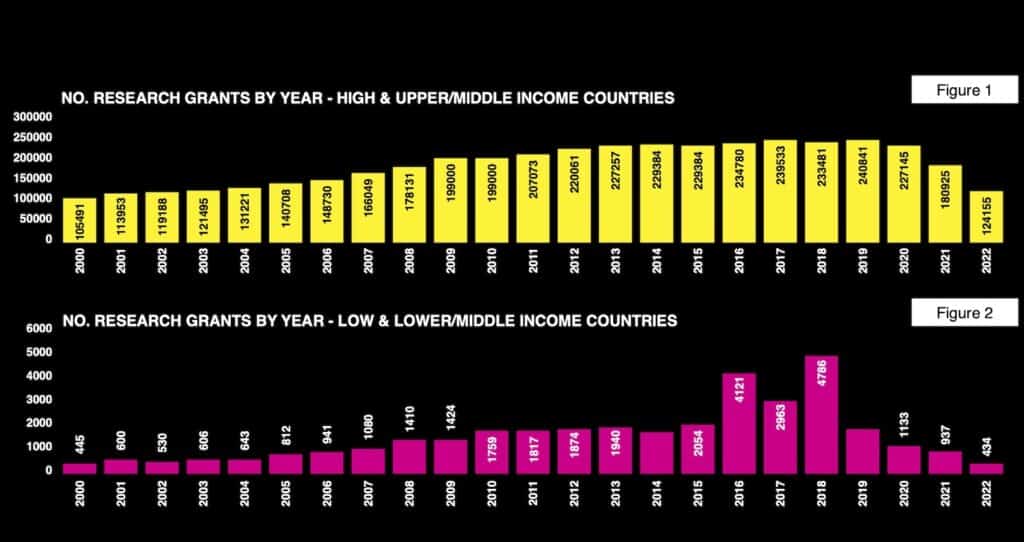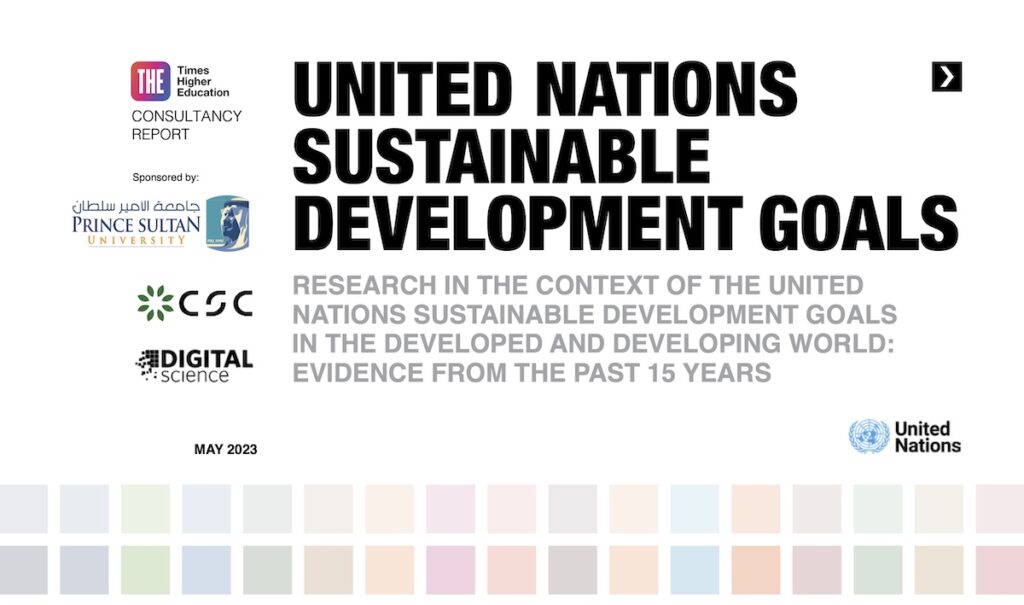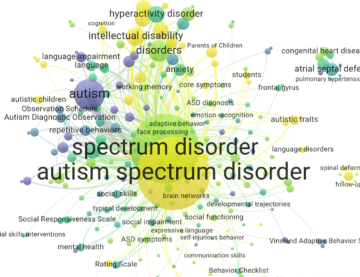Developing countries need greater recognition for research into UN Sustainable Development Goals (SDGs)
Tuesday 6 June 2023
Developing nations need greater visibility, acknowledgement and support for their research into the United Nations’ Sustainable Development Goals (SDGs), according to the authors of a major analysis of the past 15 years of worldwide research into SDGs.
The analysis – the most comprehensive of its kind to date – has formed the basis of a new White Paper, which calls for equity for developing nations within the world’s research ecosystem, particularly as those nations are often hardest hit by the issues the UN’s Global Goals are aimed at addressing.
Announced at the recent Global Sustainable Development Congress run by the Times Higher Education (THE), the white paper has been co-authored by researchers from Prince Sultan University, data experts from research technology company Digital Science, and THE.
Commissioned by THE, and using data from Dimensions, the white paper – Research in the Context of the United Nations Sustainable Development Goals in the Developed and Developing World: Evidence From the Past 15 Years – reveals significant gaps in research funding, collaboration and assessment between developed and developing countries.
“…with further collaboration from all sides, it is possible to create a more equitable research landscape, one in which research from lower income countries is both valued and acknowledged for its crucial role in addressing global challenges and advancing the SDGs.”
Ann Campbell, white paper co-author, Digital Science
The white paper unveils the unique challenges confronting lower income countries in attaining visibility and acknowledgment for their contributions towards the SDGs. The authors have sought to redress this imbalance through a series of recommendations, including:
- Targeted interventions to support lower-income countries, promote research infrastructure, and provide funding opportunities to bolster their research capacities and collaborations.
- Continued use of THE Impact Rankings to help address global inequalities and promote strong SDG partnerships between regions.
- Use of comprehensive and (if needed) bespoke metrics that capture the multidimensional aspects of research impact aligned with the SDGs, to provide valuable insights and guide policy-making and funding decisions.
- Incentives at local and international levels to accelerate SDG research and research collaboration between high-income and lower-income countries, to help uplift scholars from countries that suffer from structural, historical and contemporary imbalances of power in the global research ecosystem.
Co-author Ann Campbell, Technical Solutions Manager – Dimensions & Altmetric, Digital Science says: “Our analysis shows there is a significant gap between higher and lower income nations in relation to SDG research. We can see evidence of growing SDG research in lower income nations over the past 15 years and indeed rising international collaboration within these regions, however, the playing field is far from level. It is encouraging to see that with further collaboration from all sides, it is possible to create a more equitable research landscape, one in which research from lower income countries is both valued and acknowledged for its crucial role in addressing global challenges and advancing the SDGs.”
Co-author Professor Mohammad Nurunnabi, Director of the Center for Sustainability and Climate, Prince Sultan University says: “The SDGs cannot be achieved without the effective involvement of the higher education sector. Policymakers should come together to provide more guidelines to address the gap of research which could be a catalyst to solve many global issues and challenges. Prince Sultan University is strongly committed to this and hence the white paper series could be an eye opener for policymakers.”
Co-author Dr Ishan Cader, Director of Consultancy, THE says: “At the moment, scholars from developing countries are massively under-represented in the global research discourse on sustainability and they suffer from a lack of visibility and promotion. I believe that universities and governments have a moral and ethical duty to ensure that research from the developing world is promoted and funded.”
Phil Baty, Chief Global Affairs Officer, THE says: “University research is absolutely fundamental to achieving the UN’s Sustainable Development Goals – and that research needs to be highly collaborative, crossing borders and transcending geopolitics. Most importantly, we need to tap into expertise and research leadership right across the world – from the global north and the global south, which is on the front-line of our most pressing threats, like the climate crisis.”
Research in the Context of the United Nations Sustainable Development Goals in the Developed and Developing World: Evidence From the Past 15 Years is available on the website of the 2023 Global Sustainable Development Congress.
White paper authors: Professor Mohammad Nurunnabi (Prince Sultan University), Dr Sanjida Haque (Prince Sultan University), Ms Ann Campbell (Digital Science), Dr Juergen Wastl (Digital Science), Dr Ishan Cader (Times Higher Education).

About Prince Sultan University
Prince Sultan University (PSU) is the first private non-profit institution in Saudi Arabia. The Center for Sustainability and Climate (CSC) of Prince Sultan University is committed to the United Nations Sustainable Development Goals (SDGs) through effective institutional resources management, innovative teaching and learning, research, national and international partnerships, continuous studies, and outreach.
The mission is to support Saudi Arabia’s Vision 2030 and the PSU’s strategic directions, transforming commitments into action and building a decarbonized, more sustainable world, driving technological and economic transformations to realize sustainable competitive advantage. To coordinate, promote, and accelerate interdisciplinary research and training on sustainability and climate, and the role of humans in the environment. Prince Sultan University is the First Saudi University to Pledge Net Zero Carbon University by 2060.
About Digital Science
Digital Science is a technology company working to make research more efficient. We invest in, nurture and support innovative businesses and technologies that make all parts of the research process more open and effective. Our portfolio includes admired brands Altmetric, Dimensions, Figshare, ReadCube, Symplectic, IFI CLAIMS Patent Services, Overleaf, Writefull, and metaphacts. We believe that together, we can help researchers make a difference. Visit www.digital-science.com and follow @digitalsci on Twitter or on LinkedIn.
About Dimensions
Part of Digital Science, Dimensions is the largest linked research database and data infrastructure provider, re-imagining research discovery with access to grants, publications, clinical trials, patents and policy documents all in one place. www.dimensions.ai
About Times Higher Education
We are THE, the trusted global data partner for higher education. Drawing on five decades of expertise in the sector, millions of individual data points and with more unique institutions participating in our flagship university rankings than any other, we offer deeper and richer insight into university performance than anyone else. From powerful data-driven insights and strategic consultancy support to agenda-setting events and hiring solutions, our products and services enable everyone in higher education to make smarter, more informed decisions.
For more information, visit timeshighereducation.com or find us on Twitter: @timeshighered @THEworldunirank and @THEuniadvice
Media contacts
Simon Linacre, Head of Content, Brand & Press, Digital Science: Mobile: +44 7484 381477, s.linacre@digital-science.com
David Ellis, Press, PR & Social Manager, Digital Science, Mobile +61 447 783 023: d.ellis@digital-science.com
For more information, or to request an interview with Ishan or Phil, please contact Ben Miller: communications@timeshighereducation.com or ben.miller@timeshighereducation.com




